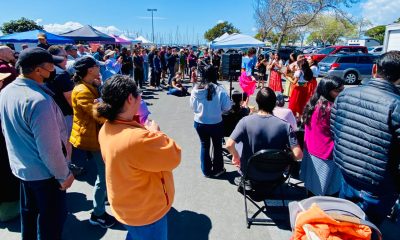Community
Oakland City Council Votes to Save Head Start Centers On the Verge of Closure
Vice Mayor Rebecca Kaplan, Council President Nikki Fortunato Bas, President Pro Tempore Sheng Thao, and Councilmember Carroll Fife coordinated with community members who called in to support the funding of the Head Start centers.

The Oakland City Council passed a budget amendment to equitably reopen Head Start childcare centers in Oakland’s most underserved communities at a special meeting on September 1.
The amendment was prompted by grass roots organizations that last month put out an urgent statement demanding the protection of vitally needed services provided by the Head Start Centers.
Vice Mayor Rebecca Kaplan, Council President Nikki Fortunato Bas, President Pro Tempore Sheng Thao, and Councilmember Carroll Fife coordinated with community members who called in to support the funding of the Head Start centers.
The Council members immediately went into action releasing an action plan to stop the planned closures of the Head Start programs, which if allowed to close, will disproportionately impact some of the most under-resourced communities in Oakland.
According to the Bureau of Labor Statistics, working mothers have been the most impacted by cuts to the workforce resulting from the COVID-19 pandemic.
The closures of schools and childcare centers created a scarcity in childcare providers causing childcare costs to reach an all-time high in 2020. As California is reopening, mothers are finding it harder to rejoin the workforce due to the lack of affordable childcare.
The City Administration planned to close the Arroyo Viejo, Franklin, and Tassafaronga centers, all located in Oakland’s most underserved communities, which would have disproportionately aimed cuts at Black people, and worsen suffering in Oakland’s hardest-hit communities, low-income families, and people of color.
The planned cuts also involve inequitable layoffs of the workers and undermine the community’s economic recovery at a precarious time.
The councilmembers’ proposal will allocate funding from an excess fund to prevent the complete closure of the three Head Start Centers.
Rev. Phyllis Scott, the first female president of the Pastors of Oakland, said her organization will work with the councilmembers who want to find the funds to restore all Head Start centers to full strength.
She said, “our underserved mothers and children, which includes my granddaughter — who was born at less than two pounds — were helped by the Head Start program. Many other families need this program that our doctors also prescribe as being supportive of early childhood development.”
Vice Mayor and Councilmember At-Large Rebecca Kaplan stated, “We must prioritize equity in our city’s COVID-19 recovery plan, and allowing our most impacted communities to have vitally needed services is a high priority.
“Head Start is an important program which helps children, with lifelong positive impacts on their future, and ensures access to economic recovery for struggling working parents. The Administration’s plan to close these needed centers and lay off these essential workers, while hiding the information from the Council and the public for months, is inappropriate.”
Nikki Fortunato Bas, Council President and District 2 Representative said that most vulnerable children and families in Oakland must be supported. The Franklin Head Start Center serves a diverse community in District 2, from the Chinatown to Eastlake to San Antonio neighborhoods, and I am fighting to protect the services for these families and the jobs for the workers caring for our children.”
“Robust investment in Head Start is investment in our future; it is long-term public safety planning; it is the right thing to do,” said District 3 Councilmember Carroll Fife. “Our local government cannot allow Head Start to fail. To do so would be to continue the practice of State-sanctioned discrimination that creates new racialized disparities and perpetuates existing ones… I am disheartened to find out that this urgent matter has been brewing for months and has only now come to the attention of the city’s elected leaders as a crisis to fix. As a working-class Black woman, like many of our Head Start providers, I have lived experience in needing access to affordable childcare. And as an elected official, I am committed to doing what it takes to keep our centers open, funded and accessible to the families who need them most.”
Sheng Thao, Council President Pro Tempore and District 4 Representative said that every parent knows the first five years of a child’s development have an enormous impact on the adult they will become. “Head Start is a vital resource to the children and parents that need support. One of my top priorities is making sure every child in Oakland has a chance to succeed. I will continue to fight to make sure Oakland Head Start is fully funded, and Oakland children are not forgotten.”
Kimberly Jones, chief of staff for Councilmember Rebecca Kaplan, provided this report.
The Oakland Post’s coverage of local news in Alameda County is supported by the Ethnic Media Sustainability Initiative, a program created by California Black Media and Ethnic Media Services to support community newspapers across California.
Activism
Oakland Post: Week of April 24 – 30, 2024
The printed Weekly Edition of the Oakland Post: Week of April 24 – 30, 2024

To enlarge your view of this issue, use the slider, magnifying glass icon or full page icon in the lower right corner of the browser window. ![]()
Alameda County
DA Pamela Price Stands by Mom Who Lost Son to Gun Violence in Oakland
Last week, The Post published a photo showing Alameda County District Attorney Pamela Price with Carol Jones, whose son, Patrick DeMarco Scott, was gunned down by an unknown assailant in 2018.

Publisher’s note: Last week, The Post published a photo showing Alameda County District Attorney Pamela Price with Carol Jones, whose son, Patrick DeMarco Scott, was gunned down by an unknown assailant in 2018. The photo was too small for readers to see where the women were and what they were doing. Here we show Price and Jones as they complete a walk in memory of Scott. For more information and to contribute, please contact Carol Jones at 510-978-5517 at morefoundation.help@gmail.com. Courtesy photo.
City Government
Vallejo Welcomes Interim City Manager Beverli Marshall
At Tuesday night’s Council meeting, the Vallejo City Council appointed Beverli Marshall as the interim city manager. Her tenure in the City Manager’s Office began today, Wednesday, April 10. Mayor Robert McConnell praised Marshall’s extensive background, noting her “wide breadth of experience in many areas that will assist the City and its citizens in understanding the complexity of the many issues that must be solved” in Vallejo.

Special to The Post
At Tuesday night’s Council meeting, the Vallejo City Council appointed Beverli Marshall as the interim city manager. Her tenure in the City Manager’s Office began today, Wednesday, April 10.
Mayor Robert McConnell praised Marshall’s extensive background, noting her “wide breadth of experience in many areas that will assist the City and its citizens in understanding the complexity of the many issues that must be solved” in Vallejo.
Current City Manager Michael Malone, whose official departure is slated for April 18, expressed his well wishes. “I wish the City of Vallejo and Interim City Manager Marshall all the best in moving forward on the progress we’ve made to improve service to residents.” Malone expressed his hope that the staff and Council will work closely with ICM Marshall to “ensure success and prosperity for the City.”
According to the Vallejo Sun, Malone stepped into the role of interim city manager in 2021 and became permanent in 2022. Previously, Malone served as the city’s water director and decided to retire from city service e at the end of his contract which is April 18.
“I hope the excellent work of City staff will continue for years to come in Vallejo,” he said. “However, recent developments have led me to this decision to announce my retirement.”
When Malone was appointed, Vallejo was awash in scandals involving the housing division and the police department. A third of the city’s jobs went unfilled during most of his tenure, making for a rocky road for getting things done, the Vallejo Sun reported.
At last night’s council meeting, McConnell explained the selection process, highlighting the council’s confidence in achieving positive outcomes through a collaborative effort, and said this afternoon, “The Council is confident that by working closely together, positive results will be obtained.”
While the search for a permanent city manager is ongoing, an announcement is expected in the coming months.
On behalf of the City Council, Mayor McConnell extended gratitude to the staff, citizen groups, and recruitment firm.
“The Council wishes to thank the staff, the citizens’ group, and the recruitment firm for their diligent work and careful consideration for the selection of what is possibly the most important decision a Council can make on behalf of the betterment of our City,” McConnell said.
The Vallejo Sun contributed to this report.
-

 Community2 weeks ago
Community2 weeks agoFinancial Assistance Bill for Descendants of Enslaved Persons to Help Them Purchase, Own, or Maintain a Home
-

 Activism3 weeks ago
Activism3 weeks agoOakland Post: Week of April 3 – 6, 2024
-

 Business2 weeks ago
Business2 weeks agoV.P. Kamala Harris: Americans With Criminal Records Will Soon Be Eligible for SBA Loans
-

 Activism2 weeks ago
Activism2 weeks agoOakland Post: Week of April 10 – 16, 2024
-

 Community2 weeks ago
Community2 weeks agoAG Bonta Says Oakland School Leaders Should Comply with State Laws to Avoid ‘Disparate Harm’ When Closing or Merging Schools
-

 Community1 week ago
Community1 week agoOakland WNBA Player to be Inducted Into Hall of Fame
-

 Community1 week ago
Community1 week agoRichmond Nonprofit Helps Ex-Felons Get Back on Their Feet
-

 Community2 weeks ago
Community2 weeks agoThe Year Ahead: Assembly Speaker Rivas Discusses Priorities, Problems



















































